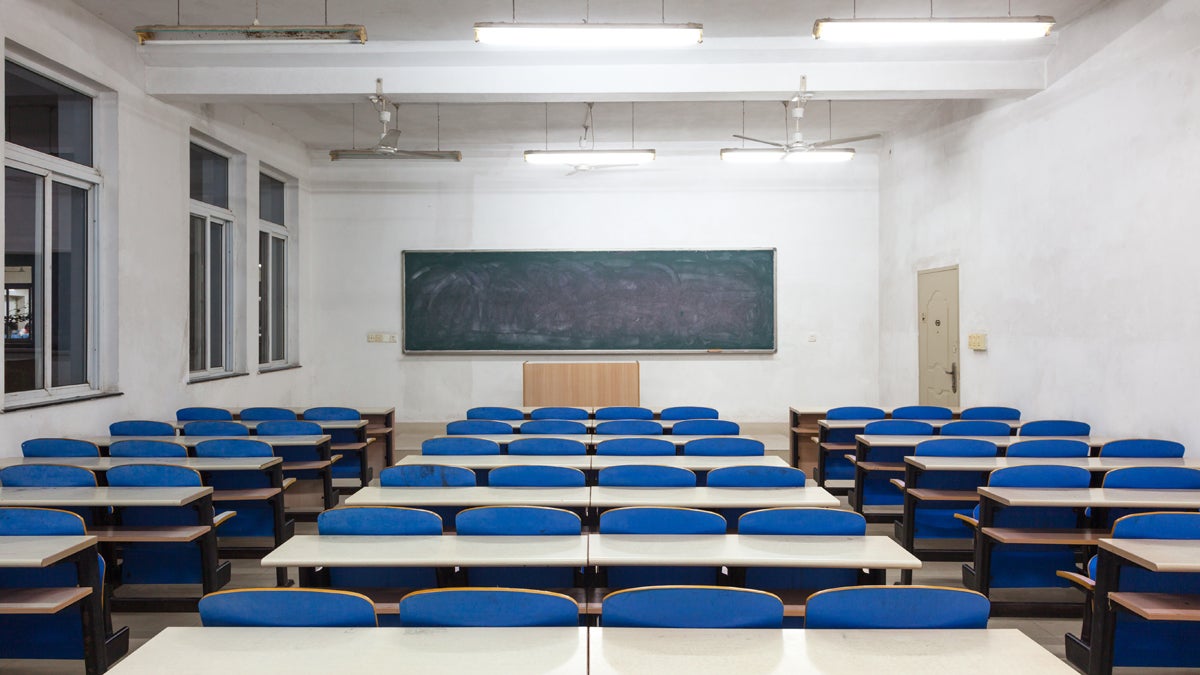Letter: Divisive cyber school rhetoric will not help fix school funding for all
 Classroom image courtesy of Shutterstock.com) " title="shutterstock_classroom_1200x675" width="1" height="1"/>
Classroom image courtesy of Shutterstock.com) " title="shutterstock_classroom_1200x675" width="1" height="1"/>
(Classroom image courtesy of Shutterstock.com)
When I read Pat Parris’s response to the NewsWorks article, “Rising cyber charter school costs fuel statewide push for reform,” I was very disappointed by his inference that individuals advocating for changes to the cyber charter school funding formula will somehow relegate children “to the status of second-class student(s).”
This letter is in response to a series of opinions about cyber charter school funding in Pennsylvania. See the related links to the right.
I am a parent of two daughters who attend a public elementary school, and I have close friends who cyber school their children. We want our children and all children in Pennsylvania to receive a great education in our public schools.
When I read Mr. Parris’s response to the NewsWorks article, “Rising cyber charter school costs fuel statewide push for reform,” I was very disappointed by his inference that individuals advocating for changes to the cyber charter school funding formula will somehow relegate children “to the status of second-class student(s).”
Mr. Parris’s rhetoric is divisive, unfair and unproductive. Legislators who are examining the cyber school funding issue are dealing with the reality that Pennsylvania is running out of money to pay for public education. In times like these, when there are limited resources to pay for educating our children, it is both responsible and necessary for our state government to take a good hard look at how precious and limited taxpayer dollars allocated for educating children are being spent.
Since 2010, the state’s share of spending for public education has dropped from 44 percent to 32 percent (the national average is 48 percent). As a result, home and business owners throughout Pennsylvania have seen their property tax bills rise as local taxpayers shoulder more of the costs associated with educating our children.
At the same time our property taxes are going up, many students in regular public schools throughout the commonwealth are losing educational opportunities. They are sitting in larger classes and have lost music, art, physical education and scores of other elective courses. They have lost reading teachers, intervention specialists, nurses, guidance counselors and after-school tutors. In the most cruel situation in Pennsylvania, a lack of adequate state funding may result in thousands of students in Philadelphia returning to school buildings this fall that are staffed only by classroom teachers and one principal.
An inefficient education option
Given the challenges facing both taxpayers and public school students in Pennsylvania, it would be irresponsible for our state lawmakers to ignore the following facts that indicate cyber schools are being paid more than it costs them to educate children:
• Former Auditor General Jack Wagner found that Pennsylvanians spend far more on charter and cyber school tuition than taxpayers in any other state. Wagner concluded that Pennsylvanians could save $365 million or more annually in taxpayer dollars if the Pennsylvania legislature’s flawed funding formula for charter and cyber charter schools were fixed.
• Cyber school tuition rates are not based on what it costs cyber schools to educate children. Instead, cyber schools receive tuition payments ranging from around $7,000 to $41,000 per student per year based on each student’s sending district and special education status.
• Under current law, cyber schools are reimbursed twice for their pension costs — once by school districts, and once by the state. This will cost taxpayers $510 million by 2016-2017.
• Some cyber schools are operated by for-profit companies. These companies use excess taxpayer dollars allocated for educating children to pay 7-figure CEO salaries, shareholder profits, astronomical advertising costs, and excessive management fees. They also spend taxpayer dollars lobbying legislators in Harrisburg in an effort to receive favorable legislative treatment.
Time to re-examine
When state funds are limited, property taxes are rising, and school districts are eliminating learning opportunities for children throughout the commonwealth, it is the responsibility of our state legislators to find solutions for these problems. Examining cyber school funding issues is just one part of our state lawmakers’ overall effort to find the best way to provide equitable, sustainable and adequate funding for all of our public school students.
It is my sincere hope that Mr. Parris and other representatives of cyber school interests will begin to discuss the issue of cyber school funding in the larger context of the public school funding crisis in Pennsylvania. It is time for public education stakeholders to come together to engage in an honest, civil, and meaningful conversation about how limited taxpayer dollars can best be spent educating all of Pennsylvania’s public school students.
I hope that representatives of cyber school interest groups will choose to abandon their divisive rhetoric, which only serves to create hostility and distract from serious issues, and become an integral part of this discussion. This is the right thing to do, and this is what our children deserve.
—
Susan Spicka is co-founder of Shippensburg-based public education advocacy group Education Matters in the Cumberland Valley.
WHYY is your source for fact-based, in-depth journalism and information. As a nonprofit organization, we rely on financial support from readers like you. Please give today.

